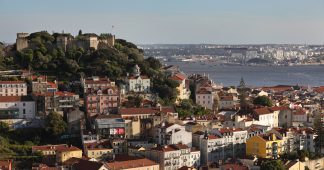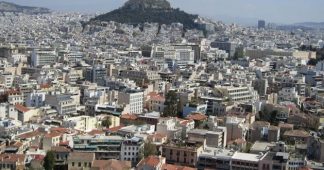The country’s left-wing coalition has prioritized private investment and economic growth over public services such as housing, education, and forest fire prevention.
By Mickaël Correia
October 3, 2019
Activists from Stop Despejos (Stop the evictions) and local families assembled outside the gray headquarters of the housing ministry in Lisbon on June 4, with placards saying, “There’s a housing crisis” and “No more property speculation,” and chants of “Homes for all!”
A few days earlier, 10 police officers evicted Maria Nazaré Jorge, 83, from her city-center apartment. “She’d lived there for 40 years,” a representative of Stop Despejos told me. “The contract was in the name of her aunt, who died recently. The rent was 200 euros a month. Because property prices in the city center have rocketed, the landlord took the opportunity to evict her.”
After an hour, a small delegation was allowed inside. A ministry spokeswoman announced that the 83-year-old had been given temporary accommodation until a permanent solution could be found. The Stop Despejos representative told me, “She’s been depressed and disorientated since her eviction. She’s living on her own up in Castelo, the city’s most touristy district, where the only public transport is the 28 tram, which is crammed with holidaymakers.”
In 2012, Pedro Passos Coelho’s center-right government (in power 2011–15) amended the housing law in favor of landlords, making it easier to increase rents at the end of a lease and to evict tenants to renovate properties. Portugal, crippled by the credit crisis of 2008, had come under the control of “the troika”—an alliance of the IMF, the Central European Bank, and the European Commission—in 2011. The Commission made the deregulation of the housing market and the development of tourism conditions of its €78 billion bailout.
Perks for foreigners
Portugal has tried since then to enhance its fiscal attractiveness as a stimulus to the real estate market. Since 2012, “golden visas”—five-year residence entitlements for non-EU foreigners who buy property in Portugal worth over €500,000—have brought in €4 billion. Non-habitual residency (NHR) status, which offers tax advantages, is available to EU pensioners who buy homes in Portugal.
“Another law, from 2014, regulating Airbnb-type rentals, lets property owners make €3,000 a month renting to tourists, compared to getting €300 from a Portuguese tenant,” said Luís Mendes, a member of Morar em Lisboa (Live in Lisbon), an umbrella organization of 40 housing rights groups. “In some parts of the city center, over half the apartments are on Airbnb. Housing-market deregulation means between one and three families are being evicted every day. Even the middle class have trouble finding somewhere to rent.” Lisbon has had a 3,000 percent increase in tourist rentals in a decade, and in 2018 overtook Barcelona and Paris as the European city with the largest number of Airbnbs per capita. Mendes said that “in four years the left-wing government has done very little about the raft of neoliberal measures that encourage the financialization of housing.”
Socialist António Costa came to power in November 2015 as leader of a government that promised to alleviate the troika’s austerity measures. With parliamentary support from the Left Bloc (Bloco de Esquerda, BE, far left), the Communists (PCP) and the Greens—the coalition is called the geringonça (the “contraption”)—the government attempted to stimulate purchasing power while trying to improve public finances. It increased the basic pension, the minimum wage (frozen at €485 until 2014 but now €600, paid 14 times a year) and basic social benefits.
This worked: In June 2017 Portugal left the EU’s “excessive deficit procedure,” which it had been in since 2009. The unemployment rate fell from 12 percent in 2015 to 6.3 percent in 2019, and the government estimates the public deficit will be close to zero in 2019 (compared to 4.4 percent of GDP in 2015), a first since Portugal became a democracy in 1974. GDP growth was 2.7 percent in 2017, a 17-year high.
The international press hailed a Portuguese economic miracle, and the left congratulated Costa’s unlikely coalition for turning its back on the neoliberal dogma of Brussels-imposed austerity. During the 2017 French presidential election campaign, the socialist candidate Benoît Hamon met Costa in Lisbon, and Jean-Luc Mélenchon of La France Insoumise (Unsubmissive France) cited the Portuguese model in promoting his manifesto.
This success also paid off in the EU election, despite a high abstention rate. The PS’s Duarte Cordeiro, the key figure in the government’s alliance with the far left, told me, “A few months before the parliamentary election in October, we won the [EU] election with 33.4 percent of the vote. We’ve now got nine Socialist MEPs [previously eight]. It’s a sign of the wide popular support for the current direction of the PS and the parties that support the government.”
“Destroying our heritage”
However, Portugal’s PS seems to have reconciled itself easily to its predecessors’ neoliberal policies, including the encouragement of tourist rentals and tax exemptions for Chinese and Russian investors. “The golden visas and NHR status are two areas where the government hasn’t reformulated its policy,” Cordeiro admitted. “But we’re open to thinking about it, probably in a future parliament.”
This January he gave the go-ahead for Real Estate Investment Trusts, a new financial vehicle giving tax exemptions and reductions for real estate investment. Since July, the government has offered a five-year 50 percent income tax discount to Portuguese citizens who left during austerity and want to return (between 2010 and 2015, half a million people—5 percent of the population—emigrated). This measure is intended to encourage better-off young graduates to come back and invest in Portugal. There is no comparable tax break for those who could not go abroad during the crisis.
The day after the Stop Despejo demonstration, Morar em Lisboa organized a debate on the city council’s stance on Airbnb rentals. In a small room in the Alfama district, people argued until it grew dark. Lurdes Pinheiro of the neighborhood association was furious: “Alfama’s becoming a theme park. Everything the council does is for the tourists, not the locals. It’s architectural barbarism, and it’s destroying our heritage.”
On a nearby street, the Socialist council recently handed over the 16th-century Santa Helena Palace to Stone Capital, one of the city’s biggest property developers, run by two French brothers, Arthur and Geoffroy Moreno. It transformed the building into 20 luxury apartments. “On the other side of Alfama hill, Stone Capital has privatized a tree-lined courtyard that’s considered the green lungs of the Graça district,” said Ana Jara, an architect and opposition councillor (PCP). “They plan to build luxury gated accommodation without any public consultation or environmental assessment.”
Since a municipal election in 2017 in which the Socialist mayor, Fernando Medina, was reelected, the council no longer scrutinizes major urban projects. They are approved directly by the office of Manuel Salgado, the deputy mayor who has been in charge of city planning for 12 years. Jara accused him of “running a neoliberal urban development strategy whose sole objective is to make Lisbon attractive for financial investment.”
Bringing down the debt
“Just five years ago, one building in three in Lisbon was derelict, dilapidated, or vacant, serving no social or economic purpose,” said Mendes of Morar em Lisboa. After the lucrative contract for Lisbon’s redevelopment went to the private sector, major municipal projects took off under Salgado. In the north, the planned Torre Portugália, a nearly 200-foot tower with luxury apartments, has been a focus of anger. Across the river Tagus, in the working-class part of the city, the Lisbon South Bay project promises to be the biggest urban redevelopment scheme since Lisbon’s Expo 98. A conference center, a marina, and upmarket hotels are planned. Its promoters say the project will “strengthen Lisbon’s status as a tourist and investment destination.” The city has become so enticing to international investors that this spring mayor Medina was invited to join the Bilderberg Meeting, the annual gathering of the Western political and economic elite.
These policies of privatizing what should be public finance windfalls, at the expense of people’s right to housing and to access to their own city, are intended to offset the Costa government’s feeble investment record. After the Socialists came to power, the purse strings have been pulled the tightest since Portugal’s democratization in 1974. In 2018 the country had the eurozone’s lowest level of public investment.
The Socialist government is obsessed with adhering to the budgetary orthodoxy imposed under EU treaties. So the main function of economic recovery has not been to improve the standard of living, but to bring down the deficit and the debt, estimated at 120 percent of GDP. “Many in the PS want to maintain good relations with the banking sector and the EU institutions, so that Portugal looks like Europe’s star pupil,” said MEP José Gusmão, leader of the Left Bloc (BE). “Its long-term objective is repaying the debt to get below the ceiling set by Brussels, 60 percent of GDP. But sticking to the current pace of debt reduction—which is unrealistic—would mean abandoning public investment for two decades.” Cordeiro admits that “our main disagreement with our partners on the left is still the pace of debt reduction. They don’t agree with our budgetary objectives. We accept them entirely.”
Finance minister Mário Centeno, a Harvard-educated neoliberal economist and current president of the Eurogroup, is responsible for the strict implementation of this policy. Rather than invest in the public sector, Centeno has recently bailed out Novo Banco for €1.6 billion; this private bank is the successor institution to Banco Espírito Santo, which failed in the crisis because of its speculation. Novo Banco had a previous €4.4 billion cash injection in 2014. Centeno’s recent decision made the radical left and communists angry, and they accuse him of preferring to clean up after private banks rather than invest in the country.
Budgetary bomb
Portugal’s universities are almost bankrupt, and the health system is understaffed and under-resourced. The state body that runs the railways estimates that 60 percent of its infrastructure is in bad or mediocre condition. Social housing is just 2 percent of the housing stock. “A framework law on housing is currently being debated in parliament, but we already know how it will go,” said Rita Silva of Habita, a housing rights association. “Despite a few positive steps, there is no political will to invest public money in housing. And António Costa has already stated that this law should not challenge the deregulation of the housing market.”
The recent teachers’ strike is symptomatic of the tension between budgetary discipline and social policy. Teachers wanted to benefit from the recovering economy and have their pensions unfrozen after nine years of austerity. But on May 5, the prime minister called parliament’s approval of this a “budgetary bomb” that would destabilize public accounts and harm Portugal’s international credibility. After Costa’s government threatened to resign if the full pension increases were approved, the teachers secured only a partial adjustment, spread over two years and nine months.
“The country is still hampered by this desire to satisfy Brussels’s demands,” said José Reis, an economist at the University of Coimbra and coordinator of the Observatory on Crises and Alternatives. “There’s been a battle to increase low incomes within the EU budget framework, but overall, wages have not returned to pre-crisis levels. This is because growth is partly dependent on precarious, low-wage work.”
The dramatic reduction of unemployment hides greater reliance on low-skill, low-wage jobs. Studies suggest that half of all new jobs are now fixed-term contracts. Since the troika’s intervention, more jobs are unsecured: 73,000 more than in 2011. Half of all overtime in 2018 was unpaid. The young are the worst-affected; 65 percent are on temporary contracts, 10 percent more than a decade ago. “We’ve made little progress on employment legislation. In fact, we’ve gone backwards,” said Gusmão. “With the support of the right and the bosses, the government has endorsed the spread of precarious, ultra-short-term contracts, which used to be confined to the tourist sector. What the geringonça has done for wage increases has been undermined by making the workforce insecure.”
Portugal’s industrial ports are a major part of the economy; between 2009 and 2018 exports rose from 27 percent to 43 percent of GDP, a remarkable increase. But their competitiveness relies on exploiting a flexible workforce and slashing wages. “In early 2013, the government passed a law deregulating port activity, which was intended to make our working conditions less secure,” said António Mariano, head of the dock workers’ union (the Sindicato dos Estivadores e da Actividade Logística, SEAL). “That led to a huge increase in subcontracting.”
In August 2018 SEAL launched a strike in solidarity with port workers in Setúbal, 30 miles away from Lisbon, where 90 percent of dockers and logistics workers are on daily contracts. “These precarious workers get no holidays and no social protection if they’re ill or have an accident at work. Some may even be contracted and dismissed twice in a single day so as to do a 16-hour shift,” said Mariano. Setúbal is a key port for AutoEuropa, a Volkswagen group plant producing 100,000 cars a year, and for the Portuguese-owned global paper giant, the Navigator Company.
“The Costa government tried to tell our movement against extreme job insecurity that it was a private-sector matter,” Mariano said. “On November 22, with the port paralyzed, the government sent in the police to break the pickets so that a shipment of cars from AutoEuropa could be loaded.” The minister of the sea, Socialist Ana Paula Vitorino, was more concerned about Volkswagens being exported than dockers’ working conditions.
In 2018 the SEAL battle ended when the Setúbal workers secured the right to collective bargaining. “But the 2013 law on port workers is still in force, despite it being raised repeatedly with the minister of the sea and parliamentary commissions that have looked at employment legislation. Today in most of this country’s ports, 25 to 50 percent of workers are underpaid and on daily contracts,” said Mariano. “The government is trying to increase productivity by breaking workers’ power to negotiate.”
Pedrógão Grande, a small town 125 miles north of Lisbon, is reached by roads that wind through a vast, desolate landscape. Forest fires there in June 2017 caused 66 deaths and reduced 30,000 hectares to ash. Most victims died trying to flee the fire on a main road that the authorities failed to close in time. The tragedy caused anger nationwide: Many felt that the effects of the fire, the worst in the country’s history, had been exacerbated because of a lack of personnel and resources. Most of Portugal’s firefighters are poorly trained volunteers and the emergency services communication system (Siresp) was a public-private partnership, considered unfit for purpose for a decade.
Portugal’s “green oil”
The Costa government was attacked; in their desire to maintain austerity and keep public spending down, the Socialists had dismantled the forestry service, privatized aerial firefighting resources, and slashed spending on forestry policy. Between 2006 and 2016, the number of forest rangers was reduced by a third in a country that is one-third forest, and where fires destroy an average of 100,000 hectares of woodland annually.
Another culprit is intensive eucalyptus cultivation. This Australian native is known to reduce soil quality and biodiversity and is highly flammable. But it has been widely planted by small growers for 20 years because it grows rapidly, requires no maintenance, and can be sold to paper manufacturers such as the Navigator Company. “Eucalyptus now accounts for a quarter of Portuguese forests. It’s the most common species in the country,” according to the League for the Protection of Nature (LPN). “Portugal has the highest concentration of eucalyptus in the world. This tree, which the state referred to as Portugal’s ‘green oil’ for a time, is viewed as a driver of the economy.”
The Navigator Company is Portugal’s third-largest exporter (3 percent of the total). “In 2002 to 2004, Manuel Barroso’s government negotiated with the company to step up its economic development,” said Nádia Piazza, whose 5-year-old son died in the 2017 fires and who leads the Association for the Victims of the Pedrógão Grande Fire. ‘Thereafter, local authorities permitted small landowners to plant eucalyptus unregulated. As forestry policy was based on short-term profit, the trees were soon everywhere in the poorest areas.” To the dismay of environmental protection organizations, Passos Coelho’s government deregulated eucalyptus growing on plots of under two hectares (80 percent of forest areas), transforming Portugal into “Eucalyptugal.”
“Pedrógão Grande is one of the country’s poorest areas. A third of our population of 2,500 is over 65 and has a pension of less than 300 euros a month,” said Valdemar Alves, its Socialist mayor. “Planting a few eucalyptus on your plot is a way of ensuring a decent income to live on.” The population has halved in 50 years. Alves said, “All the young people go to Lisbon to look for work. This rural exodus means the forests and fields are abandoned, and the lack of upkeep means fires spread more rapidly.” Piazza said, “We’ve lost loved ones, but we’ve also lost all hope. We feel abandoned.”
The town is surrounded by charred grey hills as far as the eye can see, but eucalyptus saplings are already emerging. “Fire encourages the spread of the species as well as its invasive behavior,” according to the LPN. After 2017, and with an increased risk of fire, the government boosted personnel numbers, strengthened aerial firefighting resources, and paid €7 million to bring Siresp back into public ownership. But the prime minister has appointed Tiago Martins de Oliveira, a former Navigator Company executive, to head the Agency for the Integrated Management of Rural Fires, the body set up this year to plan and coordinate fire response. The new regional forest management plan that has come into effect prioritizes eucalyptus for plantation and reforestation on 95 percent of the area. “The new programs show no will to change the situation. They’re operating as if it’s business as usual,” said the LPN.
Since last year there have been signs that Portugal’s economic boom is slowing. After seven years of uninterrupted growth, the tourism growth rate fell markedly in 2018 (down to 3.8 percent from 9.1 percent in 2017). In June Banco de Portugal warned a sudden interruption of the overheated speculation in property was possible. Economic growth, which was 2.8 percent in 2017, fell to 2.1 percent in 2018 and is predicted to be 1.7 percent this year.
The Costa government, in trying to combine social measures and budgetary rigor, may have been pursuing a mirage rather than a miracle. “The geringonça has been a political laboratory, a new experiment for the left,” said economist José Reis. “But with October’s parliamentary election imminent, can it last?”
Published at https://www.thenation.com/article/portugal-economy-public-investment/











